Entrepreneurship and Small Business: Venture Types and Impact
VerifiedAdded on 2020/10/05
|22
|6089
|324
Report
AI Summary
This report delves into the realm of entrepreneurship and small business management, focusing on various venture types and their impact on the economy, particularly within the UK. It explores the characteristics of successful entrepreneurs, highlighting the skills, traits, and mindset crucial for success. The report analyzes the UK's small-scale business landscape, emphasizing the significance of startups and their contribution to employment and GDP. It further examines the factors that foster or hinder entrepreneurship, considering both internal motivations and external environmental influences. The document concludes by summarizing the key aspects of entrepreneurial ventures and their overall importance in driving economic growth and social development. Desklib provides similar solved assignments and past papers for students.

ENTREPRENEURSHIP AND
SMALL BUSINESS
MANAGEMENT
1
SMALL BUSINESS
MANAGEMENT
1
Paraphrase This Document
Need a fresh take? Get an instant paraphrase of this document with our AI Paraphraser
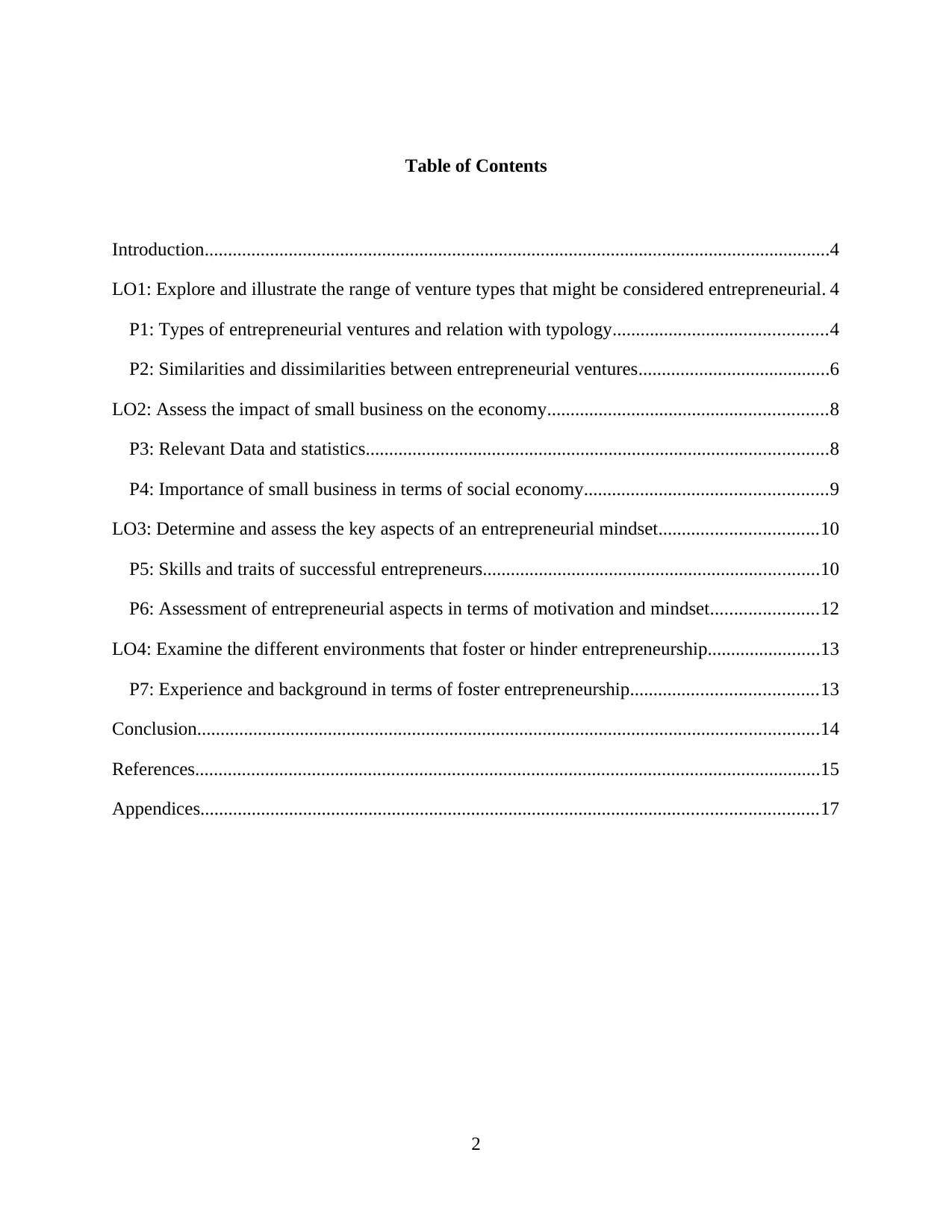
Table of Contents
Introduction......................................................................................................................................4
LO1: Explore and illustrate the range of venture types that might be considered entrepreneurial. 4
P1: Types of entrepreneurial ventures and relation with typology..............................................4
P2: Similarities and dissimilarities between entrepreneurial ventures.........................................6
LO2: Assess the impact of small business on the economy............................................................8
P3: Relevant Data and statistics...................................................................................................8
P4: Importance of small business in terms of social economy....................................................9
LO3: Determine and assess the key aspects of an entrepreneurial mindset..................................10
P5: Skills and traits of successful entrepreneurs........................................................................10
P6: Assessment of entrepreneurial aspects in terms of motivation and mindset.......................12
LO4: Examine the different environments that foster or hinder entrepreneurship........................13
P7: Experience and background in terms of foster entrepreneurship........................................13
Conclusion.....................................................................................................................................14
References......................................................................................................................................15
Appendices....................................................................................................................................17
2
Introduction......................................................................................................................................4
LO1: Explore and illustrate the range of venture types that might be considered entrepreneurial. 4
P1: Types of entrepreneurial ventures and relation with typology..............................................4
P2: Similarities and dissimilarities between entrepreneurial ventures.........................................6
LO2: Assess the impact of small business on the economy............................................................8
P3: Relevant Data and statistics...................................................................................................8
P4: Importance of small business in terms of social economy....................................................9
LO3: Determine and assess the key aspects of an entrepreneurial mindset..................................10
P5: Skills and traits of successful entrepreneurs........................................................................10
P6: Assessment of entrepreneurial aspects in terms of motivation and mindset.......................12
LO4: Examine the different environments that foster or hinder entrepreneurship........................13
P7: Experience and background in terms of foster entrepreneurship........................................13
Conclusion.....................................................................................................................................14
References......................................................................................................................................15
Appendices....................................................................................................................................17
2
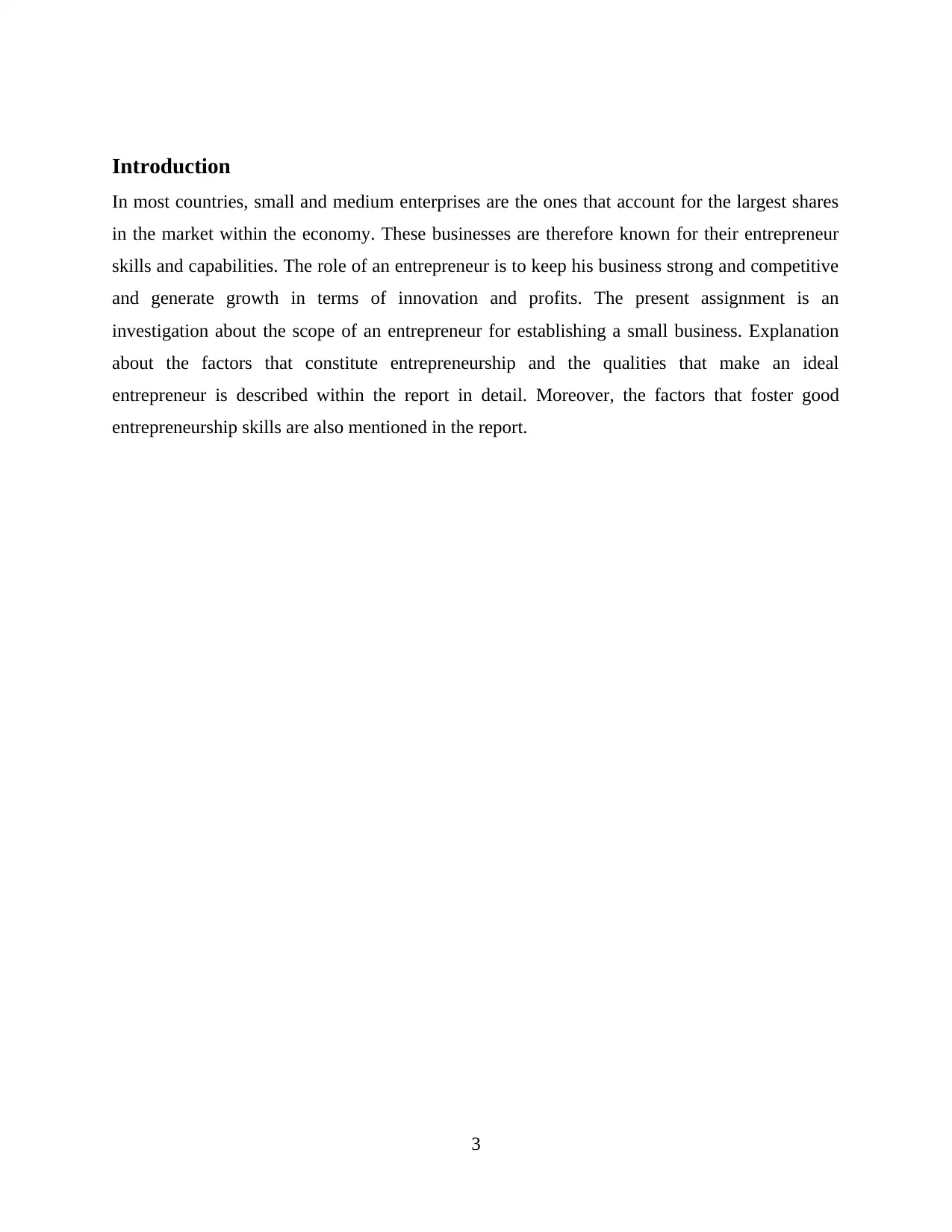
Introduction
In most countries, small and medium enterprises are the ones that account for the largest shares
in the market within the economy. These businesses are therefore known for their entrepreneur
skills and capabilities. The role of an entrepreneur is to keep his business strong and competitive
and generate growth in terms of innovation and profits. The present assignment is an
investigation about the scope of an entrepreneur for establishing a small business. Explanation
about the factors that constitute entrepreneurship and the qualities that make an ideal
entrepreneur is described within the report in detail. Moreover, the factors that foster good
entrepreneurship skills are also mentioned in the report.
3
In most countries, small and medium enterprises are the ones that account for the largest shares
in the market within the economy. These businesses are therefore known for their entrepreneur
skills and capabilities. The role of an entrepreneur is to keep his business strong and competitive
and generate growth in terms of innovation and profits. The present assignment is an
investigation about the scope of an entrepreneur for establishing a small business. Explanation
about the factors that constitute entrepreneurship and the qualities that make an ideal
entrepreneur is described within the report in detail. Moreover, the factors that foster good
entrepreneurship skills are also mentioned in the report.
3
⊘ This is a preview!⊘
Do you want full access?
Subscribe today to unlock all pages.

Trusted by 1+ million students worldwide
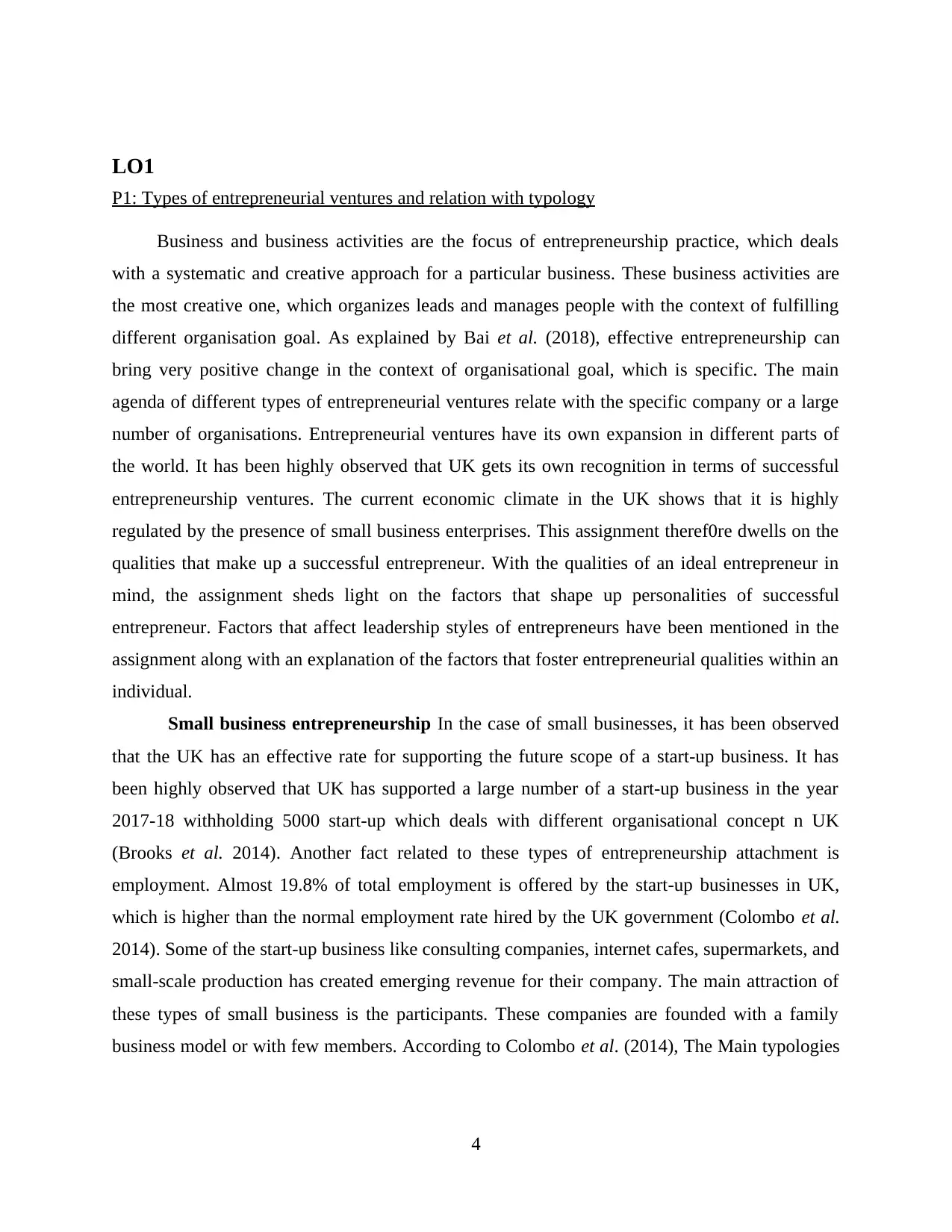
LO1
P1: Types of entrepreneurial ventures and relation with typology
Business and business activities are the focus of entrepreneurship practice, which deals
with a systematic and creative approach for a particular business. These business activities are
the most creative one, which organizes leads and manages people with the context of fulfilling
different organisation goal. As explained by Bai et al. (2018), effective entrepreneurship can
bring very positive change in the context of organisational goal, which is specific. The main
agenda of different types of entrepreneurial ventures relate with the specific company or a large
number of organisations. Entrepreneurial ventures have its own expansion in different parts of
the world. It has been highly observed that UK gets its own recognition in terms of successful
entrepreneurship ventures. The current economic climate in the UK shows that it is highly
regulated by the presence of small business enterprises. This assignment theref0re dwells on the
qualities that make up a successful entrepreneur. With the qualities of an ideal entrepreneur in
mind, the assignment sheds light on the factors that shape up personalities of successful
entrepreneur. Factors that affect leadership styles of entrepreneurs have been mentioned in the
assignment along with an explanation of the factors that foster entrepreneurial qualities within an
individual.
Small business entrepreneurship In the case of small businesses, it has been observed
that the UK has an effective rate for supporting the future scope of a start-up business. It has
been highly observed that UK has supported a large number of a start-up business in the year
2017-18 withholding 5000 start-up which deals with different organisational concept n UK
(Brooks et al. 2014). Another fact related to these types of entrepreneurship attachment is
employment. Almost 19.8% of total employment is offered by the start-up businesses in UK,
which is higher than the normal employment rate hired by the UK government (Colombo et al.
2014). Some of the start-up business like consulting companies, internet cafes, supermarkets, and
small-scale production has created emerging revenue for their company. The main attraction of
these types of small business is the participants. These companies are founded with a family
business model or with few members. According to Colombo et al. (2014), The Main typologies
4
P1: Types of entrepreneurial ventures and relation with typology
Business and business activities are the focus of entrepreneurship practice, which deals
with a systematic and creative approach for a particular business. These business activities are
the most creative one, which organizes leads and manages people with the context of fulfilling
different organisation goal. As explained by Bai et al. (2018), effective entrepreneurship can
bring very positive change in the context of organisational goal, which is specific. The main
agenda of different types of entrepreneurial ventures relate with the specific company or a large
number of organisations. Entrepreneurial ventures have its own expansion in different parts of
the world. It has been highly observed that UK gets its own recognition in terms of successful
entrepreneurship ventures. The current economic climate in the UK shows that it is highly
regulated by the presence of small business enterprises. This assignment theref0re dwells on the
qualities that make up a successful entrepreneur. With the qualities of an ideal entrepreneur in
mind, the assignment sheds light on the factors that shape up personalities of successful
entrepreneur. Factors that affect leadership styles of entrepreneurs have been mentioned in the
assignment along with an explanation of the factors that foster entrepreneurial qualities within an
individual.
Small business entrepreneurship In the case of small businesses, it has been observed
that the UK has an effective rate for supporting the future scope of a start-up business. It has
been highly observed that UK has supported a large number of a start-up business in the year
2017-18 withholding 5000 start-up which deals with different organisational concept n UK
(Brooks et al. 2014). Another fact related to these types of entrepreneurship attachment is
employment. Almost 19.8% of total employment is offered by the start-up businesses in UK,
which is higher than the normal employment rate hired by the UK government (Colombo et al.
2014). Some of the start-up business like consulting companies, internet cafes, supermarkets, and
small-scale production has created emerging revenue for their company. The main attraction of
these types of small business is the participants. These companies are founded with a family
business model or with few members. According to Colombo et al. (2014), The Main typologies
4
Paraphrase This Document
Need a fresh take? Get an instant paraphrase of this document with our AI Paraphraser
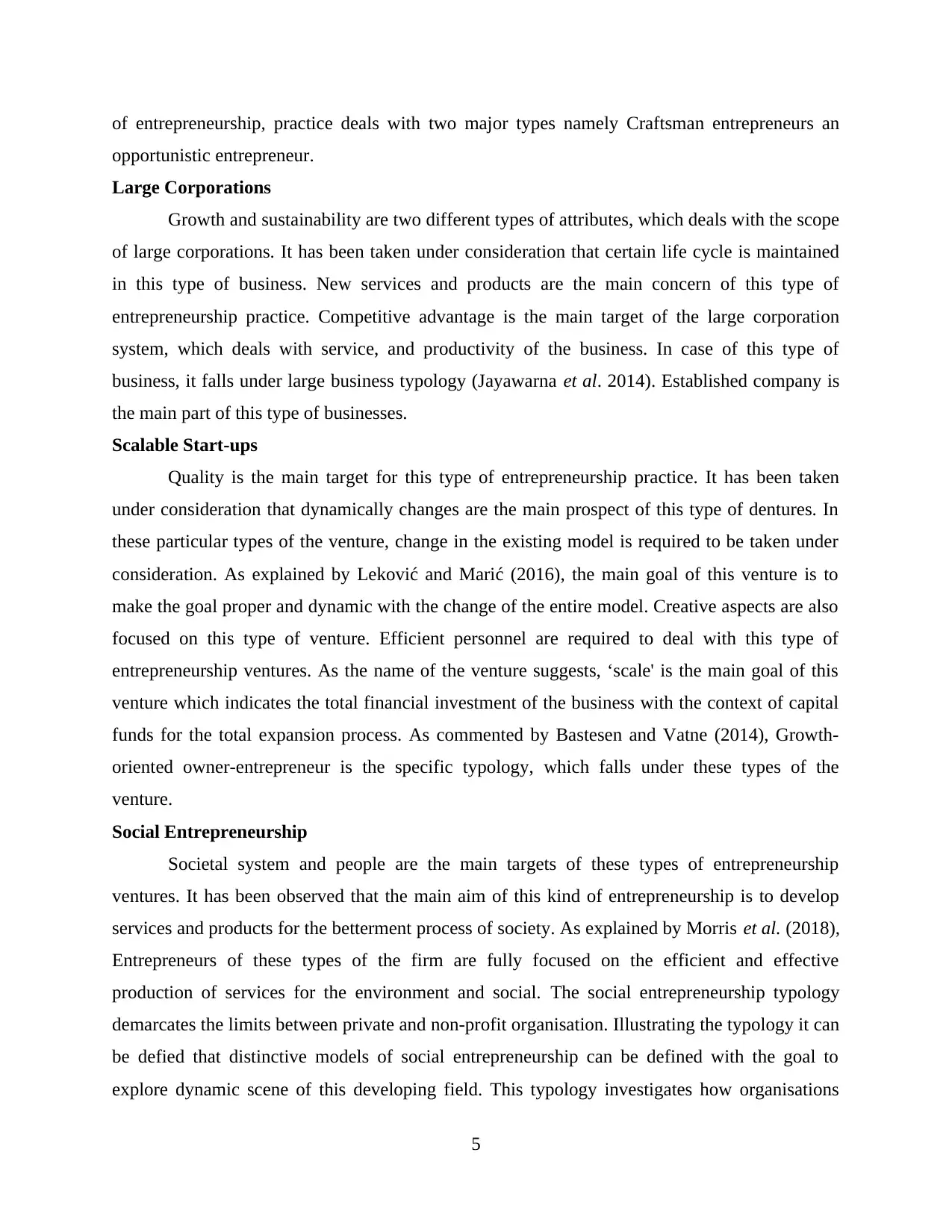
of entrepreneurship, practice deals with two major types namely Craftsman entrepreneurs an
opportunistic entrepreneur.
Large Corporations
Growth and sustainability are two different types of attributes, which deals with the scope
of large corporations. It has been taken under consideration that certain life cycle is maintained
in this type of business. New services and products are the main concern of this type of
entrepreneurship practice. Competitive advantage is the main target of the large corporation
system, which deals with service, and productivity of the business. In case of this type of
business, it falls under large business typology (Jayawarna et al. 2014). Established company is
the main part of this type of businesses.
Scalable Start-ups
Quality is the main target for this type of entrepreneurship practice. It has been taken
under consideration that dynamically changes are the main prospect of this type of dentures. In
these particular types of the venture, change in the existing model is required to be taken under
consideration. As explained by Leković and Marić (2016), the main goal of this venture is to
make the goal proper and dynamic with the change of the entire model. Creative aspects are also
focused on this type of venture. Efficient personnel are required to deal with this type of
entrepreneurship ventures. As the name of the venture suggests, ‘scale' is the main goal of this
venture which indicates the total financial investment of the business with the context of capital
funds for the total expansion process. As commented by Bastesen and Vatne (2014), Growth-
oriented owner-entrepreneur is the specific typology, which falls under these types of the
venture.
Social Entrepreneurship
Societal system and people are the main targets of these types of entrepreneurship
ventures. It has been observed that the main aim of this kind of entrepreneurship is to develop
services and products for the betterment process of society. As explained by Morris et al. (2018),
Entrepreneurs of these types of the firm are fully focused on the efficient and effective
production of services for the environment and social. The social entrepreneurship typology
demarcates the limits between private and non-profit organisation. Illustrating the typology it can
be defied that distinctive models of social entrepreneurship can be defined with the goal to
explore dynamic scene of this developing field. This typology investigates how organisations
5
opportunistic entrepreneur.
Large Corporations
Growth and sustainability are two different types of attributes, which deals with the scope
of large corporations. It has been taken under consideration that certain life cycle is maintained
in this type of business. New services and products are the main concern of this type of
entrepreneurship practice. Competitive advantage is the main target of the large corporation
system, which deals with service, and productivity of the business. In case of this type of
business, it falls under large business typology (Jayawarna et al. 2014). Established company is
the main part of this type of businesses.
Scalable Start-ups
Quality is the main target for this type of entrepreneurship practice. It has been taken
under consideration that dynamically changes are the main prospect of this type of dentures. In
these particular types of the venture, change in the existing model is required to be taken under
consideration. As explained by Leković and Marić (2016), the main goal of this venture is to
make the goal proper and dynamic with the change of the entire model. Creative aspects are also
focused on this type of venture. Efficient personnel are required to deal with this type of
entrepreneurship ventures. As the name of the venture suggests, ‘scale' is the main goal of this
venture which indicates the total financial investment of the business with the context of capital
funds for the total expansion process. As commented by Bastesen and Vatne (2014), Growth-
oriented owner-entrepreneur is the specific typology, which falls under these types of the
venture.
Social Entrepreneurship
Societal system and people are the main targets of these types of entrepreneurship
ventures. It has been observed that the main aim of this kind of entrepreneurship is to develop
services and products for the betterment process of society. As explained by Morris et al. (2018),
Entrepreneurs of these types of the firm are fully focused on the efficient and effective
production of services for the environment and social. The social entrepreneurship typology
demarcates the limits between private and non-profit organisation. Illustrating the typology it can
be defied that distinctive models of social entrepreneurship can be defined with the goal to
explore dynamic scene of this developing field. This typology investigates how organisations
5
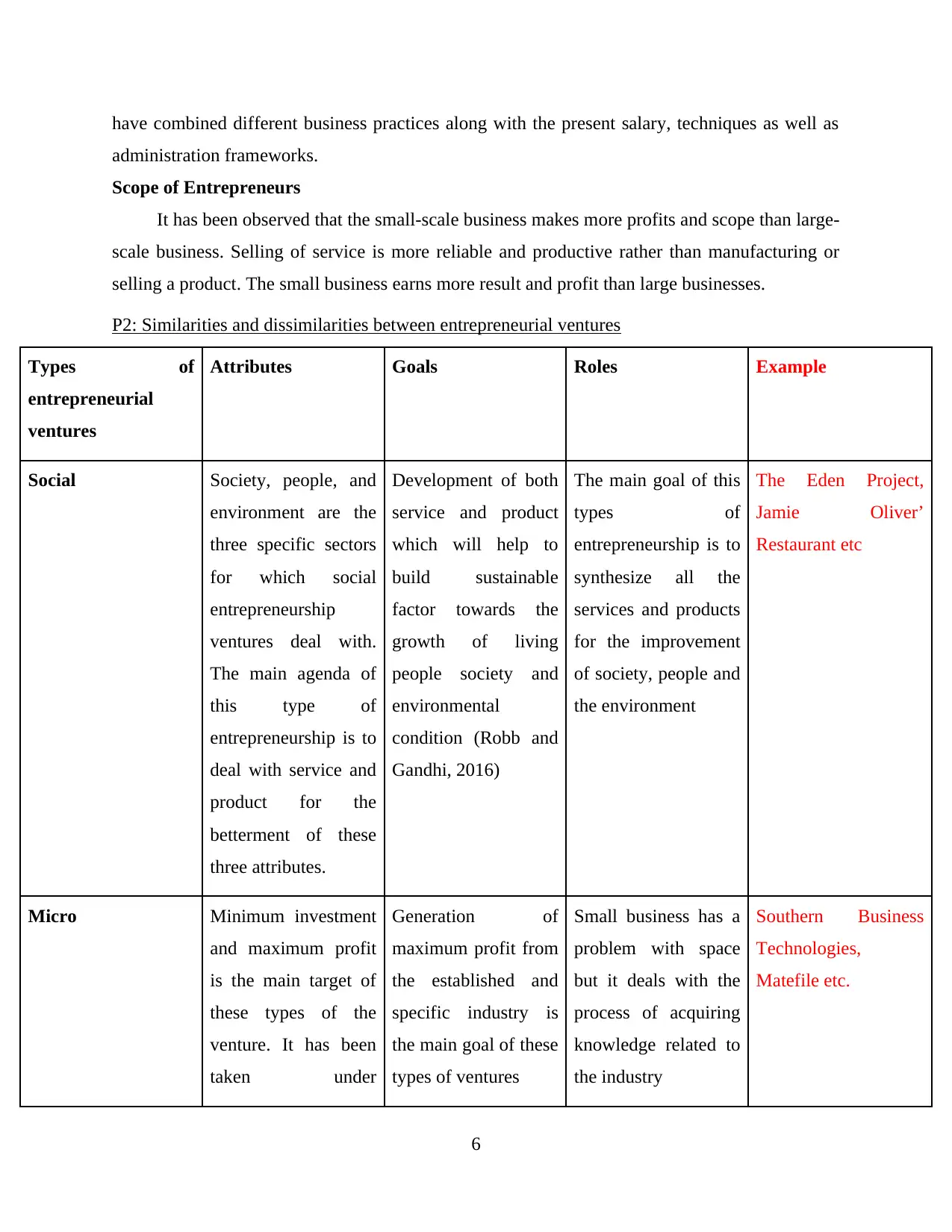
have combined different business practices along with the present salary, techniques as well as
administration frameworks.
Scope of Entrepreneurs
It has been observed that the small-scale business makes more profits and scope than large-
scale business. Selling of service is more reliable and productive rather than manufacturing or
selling a product. The small business earns more result and profit than large businesses.
P2: Similarities and dissimilarities between entrepreneurial ventures
Types of
entrepreneurial
ventures
Attributes Goals Roles Example
Social Society, people, and
environment are the
three specific sectors
for which social
entrepreneurship
ventures deal with.
The main agenda of
this type of
entrepreneurship is to
deal with service and
product for the
betterment of these
three attributes.
Development of both
service and product
which will help to
build sustainable
factor towards the
growth of living
people society and
environmental
condition (Robb and
Gandhi, 2016)
The main goal of this
types of
entrepreneurship is to
synthesize all the
services and products
for the improvement
of society, people and
the environment
The Eden Project,
Jamie Oliver’
Restaurant etc
Micro Minimum investment
and maximum profit
is the main target of
these types of the
venture. It has been
taken under
Generation of
maximum profit from
the established and
specific industry is
the main goal of these
types of ventures
Small business has a
problem with space
but it deals with the
process of acquiring
knowledge related to
the industry
Southern Business
Technologies,
Matefile etc.
6
administration frameworks.
Scope of Entrepreneurs
It has been observed that the small-scale business makes more profits and scope than large-
scale business. Selling of service is more reliable and productive rather than manufacturing or
selling a product. The small business earns more result and profit than large businesses.
P2: Similarities and dissimilarities between entrepreneurial ventures
Types of
entrepreneurial
ventures
Attributes Goals Roles Example
Social Society, people, and
environment are the
three specific sectors
for which social
entrepreneurship
ventures deal with.
The main agenda of
this type of
entrepreneurship is to
deal with service and
product for the
betterment of these
three attributes.
Development of both
service and product
which will help to
build sustainable
factor towards the
growth of living
people society and
environmental
condition (Robb and
Gandhi, 2016)
The main goal of this
types of
entrepreneurship is to
synthesize all the
services and products
for the improvement
of society, people and
the environment
The Eden Project,
Jamie Oliver’
Restaurant etc
Micro Minimum investment
and maximum profit
is the main target of
these types of the
venture. It has been
taken under
Generation of
maximum profit from
the established and
specific industry is
the main goal of these
types of ventures
Small business has a
problem with space
but it deals with the
process of acquiring
knowledge related to
the industry
Southern Business
Technologies,
Matefile etc.
6
⊘ This is a preview!⊘
Do you want full access?
Subscribe today to unlock all pages.

Trusted by 1+ million students worldwide
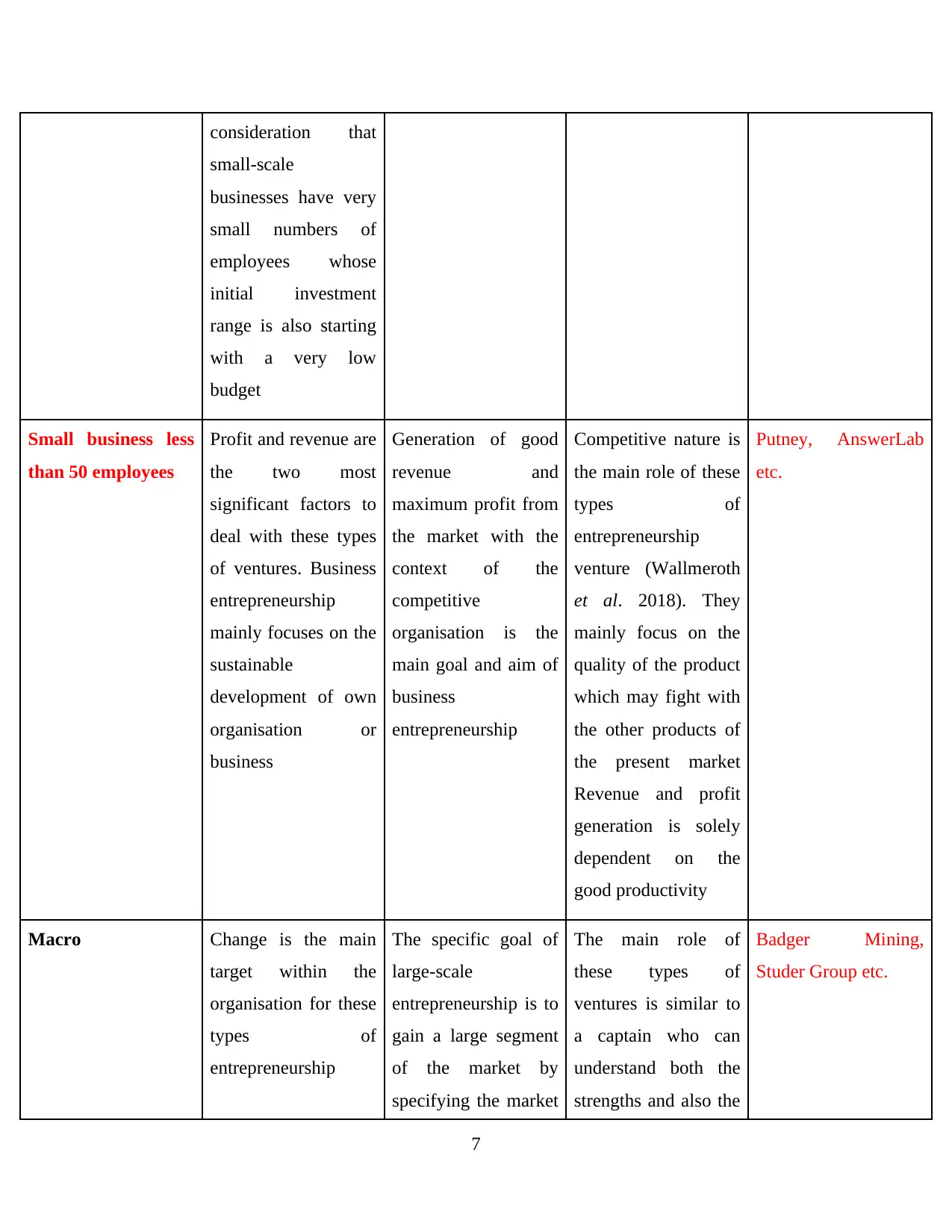
consideration that
small-scale
businesses have very
small numbers of
employees whose
initial investment
range is also starting
with a very low
budget
Small business less
than 50 employees
Profit and revenue are
the two most
significant factors to
deal with these types
of ventures. Business
entrepreneurship
mainly focuses on the
sustainable
development of own
organisation or
business
Generation of good
revenue and
maximum profit from
the market with the
context of the
competitive
organisation is the
main goal and aim of
business
entrepreneurship
Competitive nature is
the main role of these
types of
entrepreneurship
venture (Wallmeroth
et al. 2018). They
mainly focus on the
quality of the product
which may fight with
the other products of
the present market
Revenue and profit
generation is solely
dependent on the
good productivity
Putney, AnswerLab
etc.
Macro Change is the main
target within the
organisation for these
types of
entrepreneurship
The specific goal of
large-scale
entrepreneurship is to
gain a large segment
of the market by
specifying the market
The main role of
these types of
ventures is similar to
a captain who can
understand both the
strengths and also the
Badger Mining,
Studer Group etc.
7
small-scale
businesses have very
small numbers of
employees whose
initial investment
range is also starting
with a very low
budget
Small business less
than 50 employees
Profit and revenue are
the two most
significant factors to
deal with these types
of ventures. Business
entrepreneurship
mainly focuses on the
sustainable
development of own
organisation or
business
Generation of good
revenue and
maximum profit from
the market with the
context of the
competitive
organisation is the
main goal and aim of
business
entrepreneurship
Competitive nature is
the main role of these
types of
entrepreneurship
venture (Wallmeroth
et al. 2018). They
mainly focus on the
quality of the product
which may fight with
the other products of
the present market
Revenue and profit
generation is solely
dependent on the
good productivity
Putney, AnswerLab
etc.
Macro Change is the main
target within the
organisation for these
types of
entrepreneurship
The specific goal of
large-scale
entrepreneurship is to
gain a large segment
of the market by
specifying the market
The main role of
these types of
ventures is similar to
a captain who can
understand both the
strengths and also the
Badger Mining,
Studer Group etc.
7
Paraphrase This Document
Need a fresh take? Get an instant paraphrase of this document with our AI Paraphraser
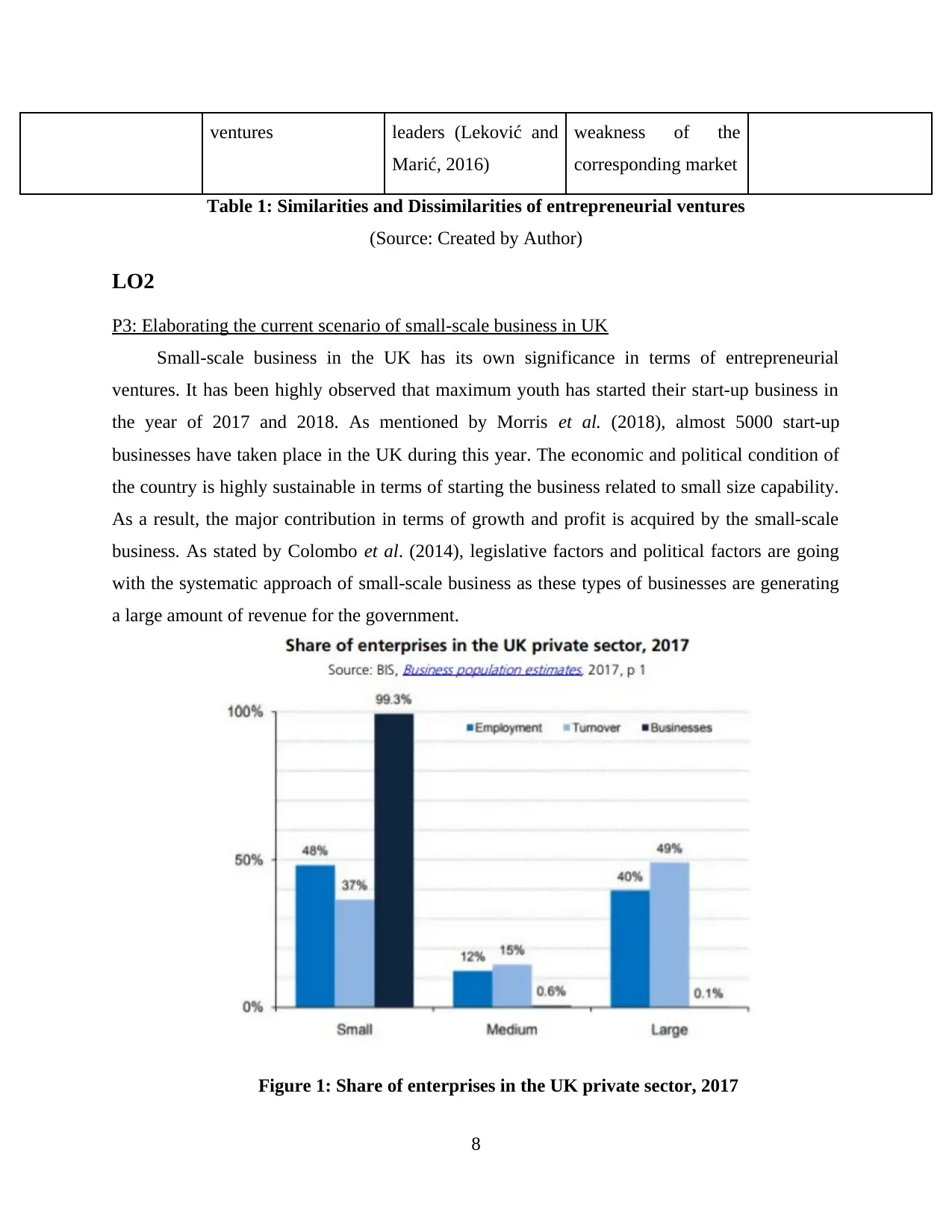
ventures leaders (Leković and
Marić, 2016)
weakness of the
corresponding market
Table 1: Similarities and Dissimilarities of entrepreneurial ventures
(Source: Created by Author)
LO2
P3: Elaborating the current scenario of small-scale business in UK
Small-scale business in the UK has its own significance in terms of entrepreneurial
ventures. It has been highly observed that maximum youth has started their start-up business in
the year of 2017 and 2018. As mentioned by Morris et al. (2018), almost 5000 start-up
businesses have taken place in the UK during this year. The economic and political condition of
the country is highly sustainable in terms of starting the business related to small size capability.
As a result, the major contribution in terms of growth and profit is acquired by the small-scale
business. As stated by Colombo et al. (2014), legislative factors and political factors are going
with the systematic approach of small-scale business as these types of businesses are generating
a large amount of revenue for the government.
Figure 1: Share of enterprises in the UK private sector, 2017
8
Marić, 2016)
weakness of the
corresponding market
Table 1: Similarities and Dissimilarities of entrepreneurial ventures
(Source: Created by Author)
LO2
P3: Elaborating the current scenario of small-scale business in UK
Small-scale business in the UK has its own significance in terms of entrepreneurial
ventures. It has been highly observed that maximum youth has started their start-up business in
the year of 2017 and 2018. As mentioned by Morris et al. (2018), almost 5000 start-up
businesses have taken place in the UK during this year. The economic and political condition of
the country is highly sustainable in terms of starting the business related to small size capability.
As a result, the major contribution in terms of growth and profit is acquired by the small-scale
business. As stated by Colombo et al. (2014), legislative factors and political factors are going
with the systematic approach of small-scale business as these types of businesses are generating
a large amount of revenue for the government.
Figure 1: Share of enterprises in the UK private sector, 2017
8
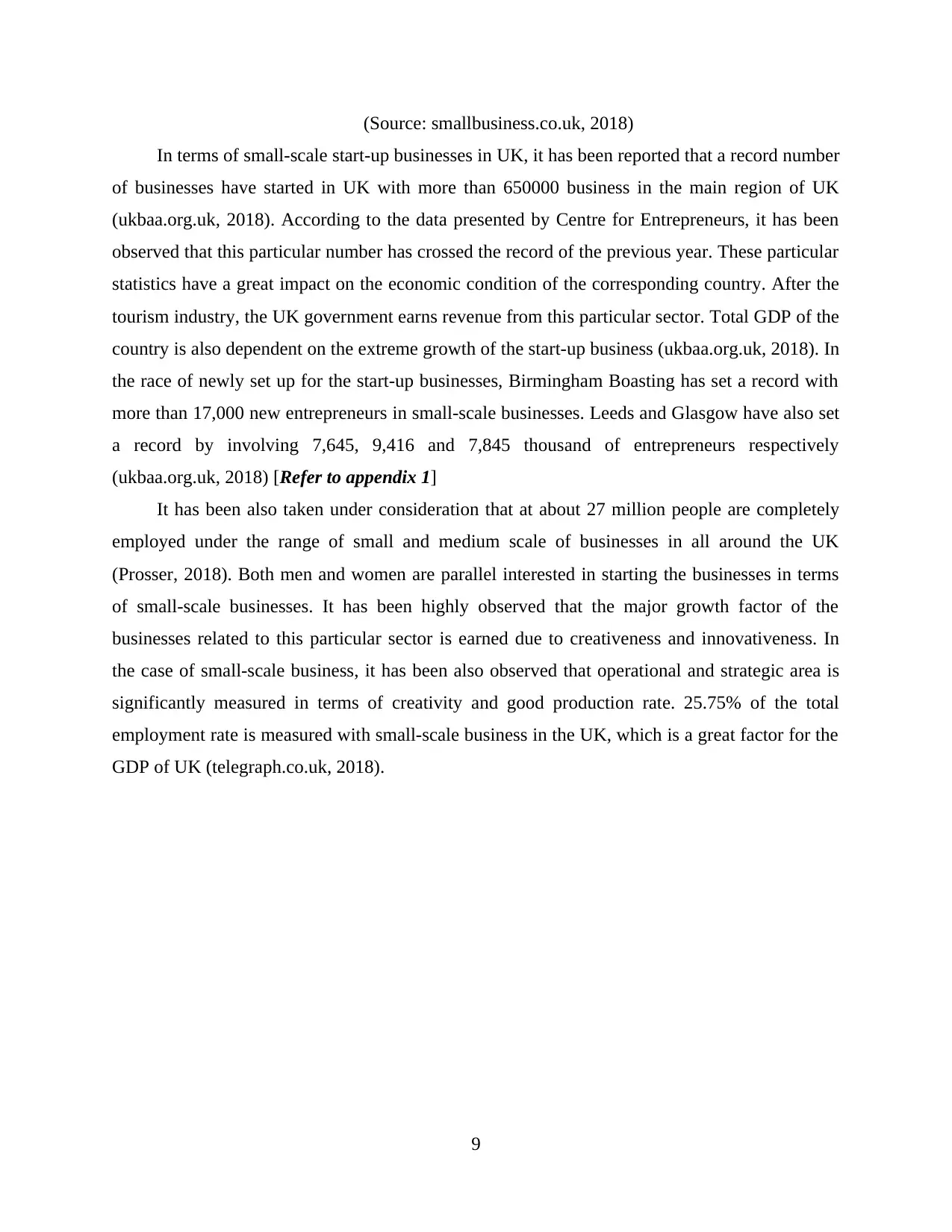
(Source: smallbusiness.co.uk, 2018)
In terms of small-scale start-up businesses in UK, it has been reported that a record number
of businesses have started in UK with more than 650000 business in the main region of UK
(ukbaa.org.uk, 2018). According to the data presented by Centre for Entrepreneurs, it has been
observed that this particular number has crossed the record of the previous year. These particular
statistics have a great impact on the economic condition of the corresponding country. After the
tourism industry, the UK government earns revenue from this particular sector. Total GDP of the
country is also dependent on the extreme growth of the start-up business (ukbaa.org.uk, 2018). In
the race of newly set up for the start-up businesses, Birmingham Boasting has set a record with
more than 17,000 new entrepreneurs in small-scale businesses. Leeds and Glasgow have also set
a record by involving 7,645, 9,416 and 7,845 thousand of entrepreneurs respectively
(ukbaa.org.uk, 2018) [Refer to appendix 1]
It has been also taken under consideration that at about 27 million people are completely
employed under the range of small and medium scale of businesses in all around the UK
(Prosser, 2018). Both men and women are parallel interested in starting the businesses in terms
of small-scale businesses. It has been highly observed that the major growth factor of the
businesses related to this particular sector is earned due to creativeness and innovativeness. In
the case of small-scale business, it has been also observed that operational and strategic area is
significantly measured in terms of creativity and good production rate. 25.75% of the total
employment rate is measured with small-scale business in the UK, which is a great factor for the
GDP of UK (telegraph.co.uk, 2018).
9
In terms of small-scale start-up businesses in UK, it has been reported that a record number
of businesses have started in UK with more than 650000 business in the main region of UK
(ukbaa.org.uk, 2018). According to the data presented by Centre for Entrepreneurs, it has been
observed that this particular number has crossed the record of the previous year. These particular
statistics have a great impact on the economic condition of the corresponding country. After the
tourism industry, the UK government earns revenue from this particular sector. Total GDP of the
country is also dependent on the extreme growth of the start-up business (ukbaa.org.uk, 2018). In
the race of newly set up for the start-up businesses, Birmingham Boasting has set a record with
more than 17,000 new entrepreneurs in small-scale businesses. Leeds and Glasgow have also set
a record by involving 7,645, 9,416 and 7,845 thousand of entrepreneurs respectively
(ukbaa.org.uk, 2018) [Refer to appendix 1]
It has been also taken under consideration that at about 27 million people are completely
employed under the range of small and medium scale of businesses in all around the UK
(Prosser, 2018). Both men and women are parallel interested in starting the businesses in terms
of small-scale businesses. It has been highly observed that the major growth factor of the
businesses related to this particular sector is earned due to creativeness and innovativeness. In
the case of small-scale business, it has been also observed that operational and strategic area is
significantly measured in terms of creativity and good production rate. 25.75% of the total
employment rate is measured with small-scale business in the UK, which is a great factor for the
GDP of UK (telegraph.co.uk, 2018).
9
⊘ This is a preview!⊘
Do you want full access?
Subscribe today to unlock all pages.

Trusted by 1+ million students worldwide
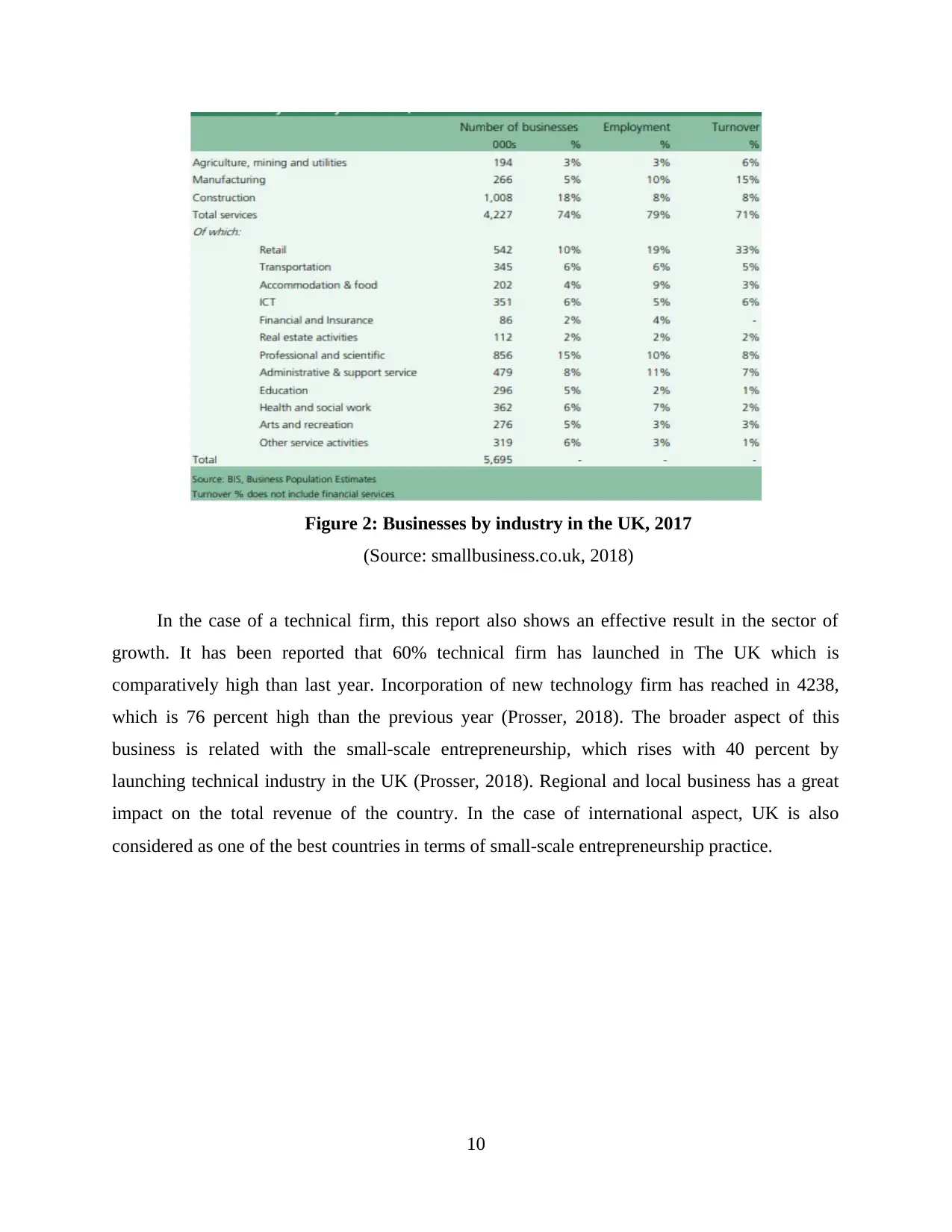
Figure 2: Businesses by industry in the UK, 2017
(Source: smallbusiness.co.uk, 2018)
In the case of a technical firm, this report also shows an effective result in the sector of
growth. It has been reported that 60% technical firm has launched in The UK which is
comparatively high than last year. Incorporation of new technology firm has reached in 4238,
which is 76 percent high than the previous year (Prosser, 2018). The broader aspect of this
business is related with the small-scale entrepreneurship, which rises with 40 percent by
launching technical industry in the UK (Prosser, 2018). Regional and local business has a great
impact on the total revenue of the country. In the case of international aspect, UK is also
considered as one of the best countries in terms of small-scale entrepreneurship practice.
10
(Source: smallbusiness.co.uk, 2018)
In the case of a technical firm, this report also shows an effective result in the sector of
growth. It has been reported that 60% technical firm has launched in The UK which is
comparatively high than last year. Incorporation of new technology firm has reached in 4238,
which is 76 percent high than the previous year (Prosser, 2018). The broader aspect of this
business is related with the small-scale entrepreneurship, which rises with 40 percent by
launching technical industry in the UK (Prosser, 2018). Regional and local business has a great
impact on the total revenue of the country. In the case of international aspect, UK is also
considered as one of the best countries in terms of small-scale entrepreneurship practice.
10
Paraphrase This Document
Need a fresh take? Get an instant paraphrase of this document with our AI Paraphraser
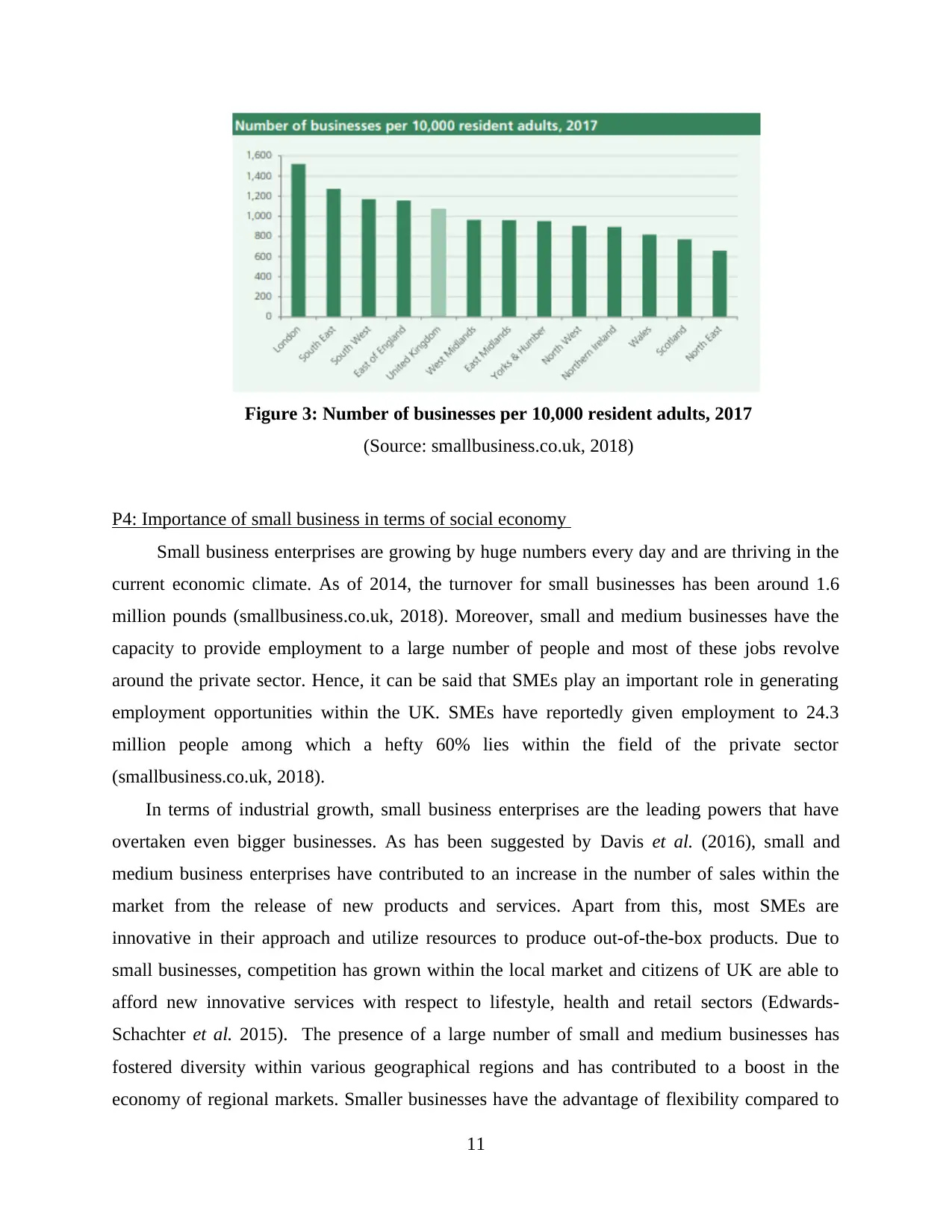
Figure 3: Number of businesses per 10,000 resident adults, 2017
(Source: smallbusiness.co.uk, 2018)
P4: Importance of small business in terms of social economy
Small business enterprises are growing by huge numbers every day and are thriving in the
current economic climate. As of 2014, the turnover for small businesses has been around 1.6
million pounds (smallbusiness.co.uk, 2018). Moreover, small and medium businesses have the
capacity to provide employment to a large number of people and most of these jobs revolve
around the private sector. Hence, it can be said that SMEs play an important role in generating
employment opportunities within the UK. SMEs have reportedly given employment to 24.3
million people among which a hefty 60% lies within the field of the private sector
(smallbusiness.co.uk, 2018).
In terms of industrial growth, small business enterprises are the leading powers that have
overtaken even bigger businesses. As has been suggested by Davis et al. (2016), small and
medium business enterprises have contributed to an increase in the number of sales within the
market from the release of new products and services. Apart from this, most SMEs are
innovative in their approach and utilize resources to produce out-of-the-box products. Due to
small businesses, competition has grown within the local market and citizens of UK are able to
afford new innovative services with respect to lifestyle, health and retail sectors (Edwards-
Schachter et al. 2015). The presence of a large number of small and medium businesses has
fostered diversity within various geographical regions and has contributed to a boost in the
economy of regional markets. Smaller businesses have the advantage of flexibility compared to
11
(Source: smallbusiness.co.uk, 2018)
P4: Importance of small business in terms of social economy
Small business enterprises are growing by huge numbers every day and are thriving in the
current economic climate. As of 2014, the turnover for small businesses has been around 1.6
million pounds (smallbusiness.co.uk, 2018). Moreover, small and medium businesses have the
capacity to provide employment to a large number of people and most of these jobs revolve
around the private sector. Hence, it can be said that SMEs play an important role in generating
employment opportunities within the UK. SMEs have reportedly given employment to 24.3
million people among which a hefty 60% lies within the field of the private sector
(smallbusiness.co.uk, 2018).
In terms of industrial growth, small business enterprises are the leading powers that have
overtaken even bigger businesses. As has been suggested by Davis et al. (2016), small and
medium business enterprises have contributed to an increase in the number of sales within the
market from the release of new products and services. Apart from this, most SMEs are
innovative in their approach and utilize resources to produce out-of-the-box products. Due to
small businesses, competition has grown within the local market and citizens of UK are able to
afford new innovative services with respect to lifestyle, health and retail sectors (Edwards-
Schachter et al. 2015). The presence of a large number of small and medium businesses has
fostered diversity within various geographical regions and has contributed to a boost in the
economy of regional markets. Smaller businesses have the advantage of flexibility compared to
11
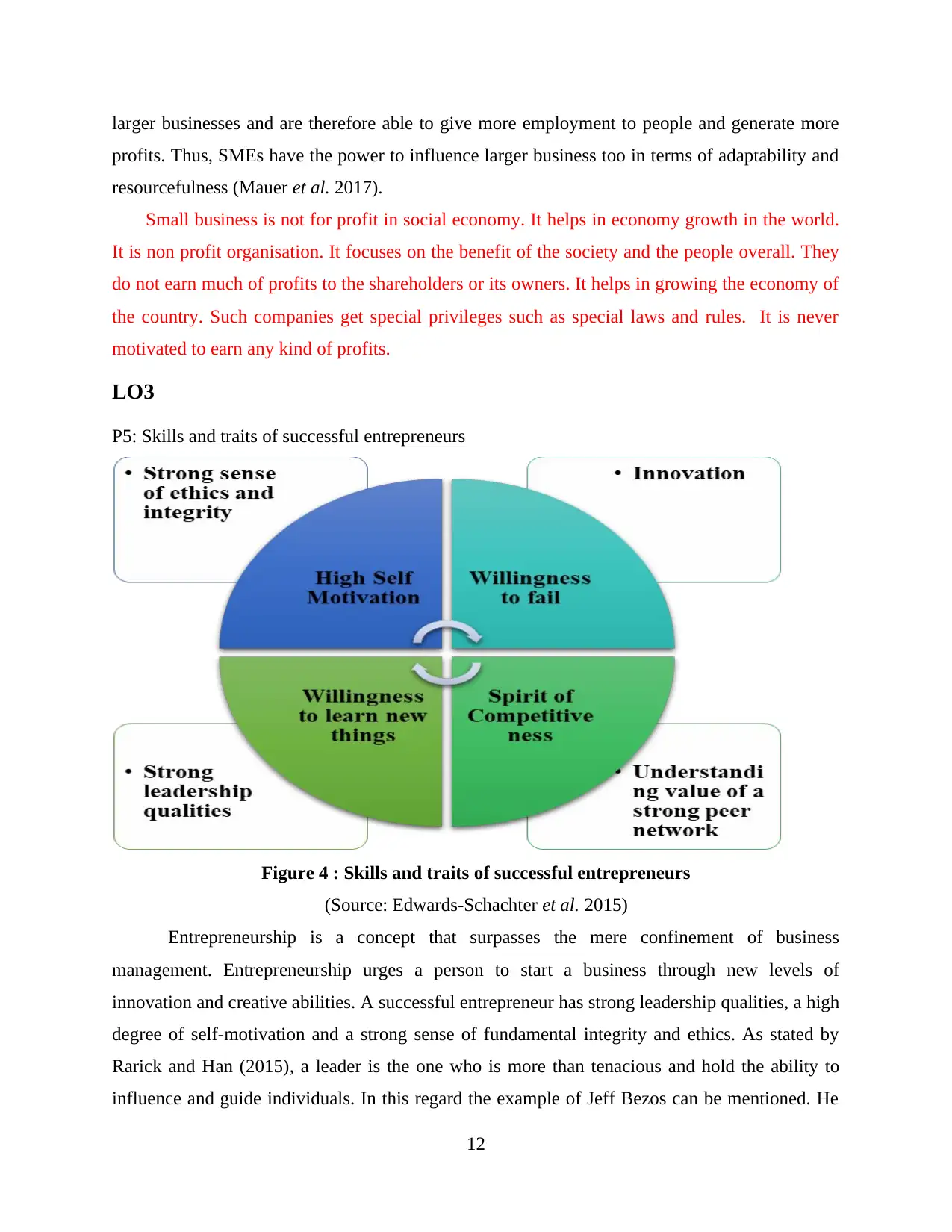
larger businesses and are therefore able to give more employment to people and generate more
profits. Thus, SMEs have the power to influence larger business too in terms of adaptability and
resourcefulness (Mauer et al. 2017).
Small business is not for profit in social economy. It helps in economy growth in the world.
It is non profit organisation. It focuses on the benefit of the society and the people overall. They
do not earn much of profits to the shareholders or its owners. It helps in growing the economy of
the country. Such companies get special privileges such as special laws and rules. It is never
motivated to earn any kind of profits.
LO3
P5: Skills and traits of successful entrepreneurs
Figure 4 : Skills and traits of successful entrepreneurs
(Source: Edwards-Schachter et al. 2015)
Entrepreneurship is a concept that surpasses the mere confinement of business
management. Entrepreneurship urges a person to start a business through new levels of
innovation and creative abilities. A successful entrepreneur has strong leadership qualities, a high
degree of self-motivation and a strong sense of fundamental integrity and ethics. As stated by
Rarick and Han (2015), a leader is the one who is more than tenacious and hold the ability to
influence and guide individuals. In this regard the example of Jeff Bezos can be mentioned. He
12
profits. Thus, SMEs have the power to influence larger business too in terms of adaptability and
resourcefulness (Mauer et al. 2017).
Small business is not for profit in social economy. It helps in economy growth in the world.
It is non profit organisation. It focuses on the benefit of the society and the people overall. They
do not earn much of profits to the shareholders or its owners. It helps in growing the economy of
the country. Such companies get special privileges such as special laws and rules. It is never
motivated to earn any kind of profits.
LO3
P5: Skills and traits of successful entrepreneurs
Figure 4 : Skills and traits of successful entrepreneurs
(Source: Edwards-Schachter et al. 2015)
Entrepreneurship is a concept that surpasses the mere confinement of business
management. Entrepreneurship urges a person to start a business through new levels of
innovation and creative abilities. A successful entrepreneur has strong leadership qualities, a high
degree of self-motivation and a strong sense of fundamental integrity and ethics. As stated by
Rarick and Han (2015), a leader is the one who is more than tenacious and hold the ability to
influence and guide individuals. In this regard the example of Jeff Bezos can be mentioned. He
12
⊘ This is a preview!⊘
Do you want full access?
Subscribe today to unlock all pages.

Trusted by 1+ million students worldwide
1 out of 22
Related Documents
Your All-in-One AI-Powered Toolkit for Academic Success.
+13062052269
info@desklib.com
Available 24*7 on WhatsApp / Email
![[object Object]](/_next/static/media/star-bottom.7253800d.svg)
Unlock your academic potential
Copyright © 2020–2026 A2Z Services. All Rights Reserved. Developed and managed by ZUCOL.




